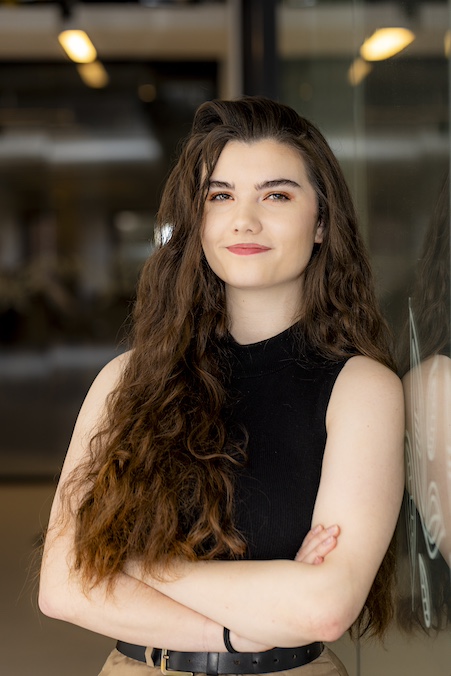Veronica Mills began working at Let’s Talk Science in the summer of 2022 as a summer student for the Fund Development team, working on administrative tasks and data entry. When the summer ended, she took on a long-term contract to continue working with Fund Development, but it wasn’t long before her role started to evolve. “I began to work primarily with the Digital Asset Management team,” says Mills. In her new role, Mills was responsible for managing Let’s Talk Science’s digital assets, as well as onboarding employees to Let’s Talk Science’s new digital asset management software. She has since shifted her focus to her new role as a full-time student at Fanshawe College. Despite her work history, Mills’ experience with Let’s Talk Science began years before, when she was still a student.
“I was originally introduced to Let’s Talk Science through some outreach they were doing,” Mills says. As a homeschooling student when she was younger, Mills recalls Let’s Talk Science volunteers coming out often to do workshops on different subjects, such as biology, genetics, and physics. Having had exposure to Let’s Talk Science from a young age, it didn’t come as a surprise when, in Grade 6, Mills and a few other students from her homeschooling group teamed up to compete in their first Let’s Talk Science Challenge.
“I loved the Let’s Talk Science Challenge,” says Mills. “It was always a highlight.” Mills competed for three years, from 2015-2017, and only has fond memories from her experiences. From training with friends for months before to the actual competitions, Mills cherished her times competing. “It was very challenging content, but it set me up so well for high school,” says Mills, reflecting on how her time competing helped prepare her for the future. “I remember getting to high school and being really nervous because I loved science, and I was thinking: ‘Oh my gosh. I need to do super well.’ And then I realized that half of the content in high school I had already covered in the Let’s Talk Science Challenge.”

Aside from academics, Mills believes one of the biggest benefits of the Let’s Talk Science Challenge is the opportunity it gives kids to experience team competition. “Every kid wants that experience of competing and being a part of a group, training, and practicing,” says Mills. “It’s nice to have space for those who aren’t necessarily wanting to do that in a sports sense.” Despite never really getting into the aspect of the competition that included developing creative team names and costumes, Mills still recalls the bonds she formed with the other students on her team. Coming from her homeschooling background, the other students on her team weren’t people Mills knew that well, but rather other homeschooled kids from her community, but the Challenge quickly brought them together. “Hanging out in someone's basement answering really, really, super nerdy trivia questions about science kind of brought us together., Mills says. “We’ve maintained that connection ever since.”
Now, having spent over a year and a half working for Let’s Talk Science, the people remained the best part of her experience, which she admits is “super cheesy,” but true. “The people at Let’s Talk Science believe so firmly in what they’re doing that it makes it easier to feel passionate about your job,” says Mills. She feels incredibly privileged to have had the opportunity to work in such a positive workplace and that everyone is nice, smart, and inclusive. It reminds her of her days competing in the Let’s Talk Science Challenge. “It’s like working with the people who you did the Challenge with,” Mills says. “Except now I was working with the people that made the Challenge.”
Mills currently studies marketing at Fanshawe College. Despite not choosing a traditional STEM path herself, she cannot stress enough how important she believes STEM education is for students. “I think people often think of it as either ‘I want to go into science, or I don’t,’ which is really unfortunate because when you’re learning anything, you’re not just learning the subject matter, you’re also learning how to learn, you’re learning how to think critically, how to engage with the world around you,” Mills asserts. “Especially with STEM, you're learning skills that you'll use practically for the rest of your life, even if you’re not going to use them in your job specifically.” Mills pointed out subjects like climate change and evolving technologies as areas which affect everyone, even those in non-STEM careers, “Even in career choices that are not related to STEM, you are going to use basic mathematics, you might need to learn a little bit about engineering…I don't think there's any career path that hasn’t been affected by technology in the past couple of years.”
Looking forward, Mills’ biggest hope for the future is that we can make education, specifically STEM education, available to everyone and for young students to keep an open mind to STEM, no matter how they are academically. “There's often this myth that if you’re good at school, you’re smart, and if you are not, you’re not smart,” says Mills. “Being academically smart is just one tiny part of the brain and someone's ability.” She recognizes that learning is an ongoing process and celebrates it.
Mills encourages students to continue to learn and try engaging in new and meaningful ways, even if they are not in the same ways as their peers. “I just think that if we can make science more fun, make it something that people want to learn about, if we can make people want to learn and be constant learners, then that won't stop. They will go through their whole life wanting to be STEM learners.”